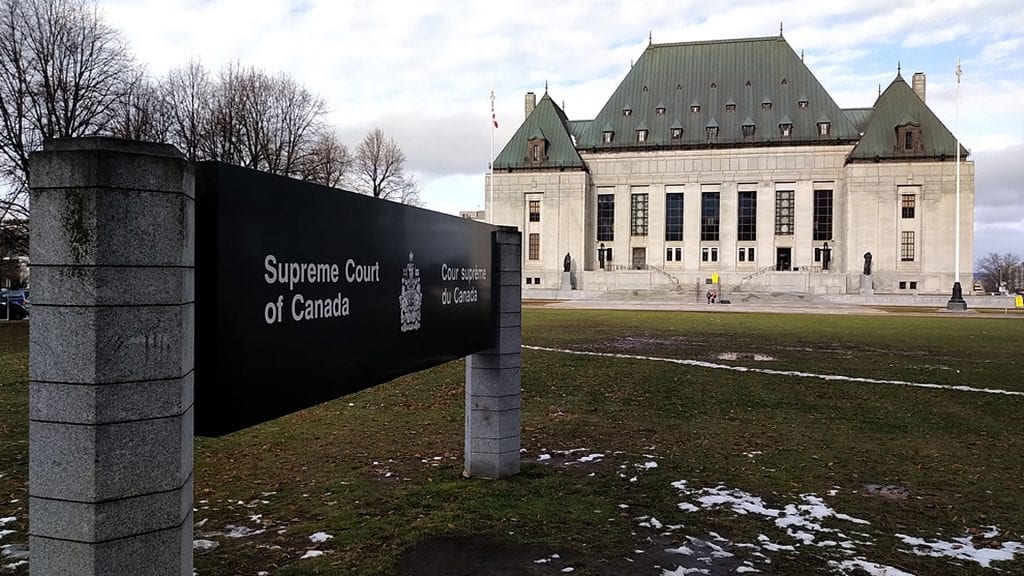
The Supreme Court of Canada says the federal carbon tax is entirely constitutional.
The split decision upholds a pivotal part of the Liberal climate-change plan, accounting for at least one-third of the emissions Canada aims to cut over the next decade.
Chief Justice Richard Wagner says in the written ruling that climate change is a real danger and evidence shows a price on pollution is a critical element in addressing it.
“It is a threat of the highest order to the country, and indeed to the world,” Wagner wrote for six of the nine judges.
Given that, said Wagner, Canada’s evidence that this is a matter of national concern, is sound.
“The undisputed existence of a threat to the future of humanity cannot be ignored,” he wrote.
Shortly after the ruling, the national chief of the Assembly of First Nations agreed in a tweet.
“This ruling helps Mother Earth from the climate crisis and slow the irreversible harm that would be felt disproportionately by vulnerable communities and regions in Canada,” said Perry Bellegarde.
Environment Minister Jonathan Wilkinson issued an immediate statement lauding the decision as “a win for the millions of Canadians who believe we must build a prosperous economy that fights climate change.”
“The question is whether this decision will put an end to the efforts of Conservative politicians fighting climate action in court, and whether they will join Canadians in fighting climate change.”
Today's @SCC_eng ruling that Canada’s carbon price is constitutional is a win for all Canadians.
This ruling helps protect Mother Earth from the climate crisis and slow the irreversible harm that would be felt disproportionately by vulnerable communities and regions in Canada. pic.twitter.com/rZveUAptFL
— Perry Bellegarde (@perrybellegarde) March 25, 2021
The onus was on the federal government to prove to the court that this is an issue of national concern that would allow it to take control of the matter rather than leaving it to the provinces.
The majority of the court found the federal government did that, noting all parties, including the provinces challenging the law, agreed climate change is “an existential challenge.”
“This context, on its own, provides some assurance that in the case at bar, Canada is not seeking to invoke the national concern doctrine too lightly,” Wagner wrote.
Wagner also wrote provinces can’t set minimum national standards on their own and if even one province fails to reduce its emissions, that could have an inordinate impact on other provinces.
He noted that the three provinces that challenged the ruling also withdrew from the Pan-Canadian Framework on Clean Growth and Climate Change.
That agreement, signed in 2016, agreed to set a national carbon price.
“When provinces that are collectively responsible for more than two-thirds of Canada’s total GHG emissions opt out of a cooperative scheme, this illustrates the stark limitations of a non-binding cooperative approach,” he wrote.
That left the remaining provinces, responsible for only one-third of Canada’s total emissions, “vulnerable to the consequences of the lion’s share of the emissions being generated by the non-participating provinces.”
He also said climate change in Canada is having a disproportionate impact on the Canadian Arctic, coastal communities and Indigenous territories.
Justice Suzanne Cote dissented in part, agreeing climate change is an issue of national concern but taking issue with the power the federal cabinet gave itself to adjust the law’s scope, including which fuels the price would apply to.
Justices Malcolm Rowe and Russell Brown dissented with the entire decision, arguing Canada had not shown that climate change reaches the level of national concern.
They objected that the precedent the majority’s decision sets would allow Ottawa to set minimum national standards in all areas of provincial jurisdiction.
Wagner pushed back, finding there is a limited scope for national standards that is unchanged by this ruling.
Canada implemented the Greenhouse Gas Pollution Pricing Act in 2019, setting a minimum price on carbon emissions in provinces that don’t have equivalent provincial prices, a law that was challenged by Saskatchewan, Ontario and Alberta.
The program applies a price per tonne to fuel purchases by individuals and businesses with lower emissions, and on part of the actual emissions produced by entities with large emissions, such as pipelines, manufacturing plants and coal-fired power plants.
The federal fuel-input charge applies in Ontario, Manitoba, Saskatchewan and Alberta, while the federal charge for big emitters currently covers only Manitoba and Prince Edward Island.
All other provinces have systems that meet the federal threshold.
The territories adopted the federal fuel charge.
Ecojustice, which argued in favour of the tax, says it’s a step in fighting the climate crisis.
“We are pleased Canada’s highest court has confirmed that the federal government has the legal authority to fight climate change through minimum national standards of price stringency to reduce GHG emissions,” said Joshua Ginsberg, lawyer with Ecojustice’s law clinic at the University of Ottawa.
“Now Canadians can rest assured that all provinces will do their fair share to tackle the climate crisis, getting Canada on the path to meeting our Paris commitments and net-zero emissions by 2050.”
Across the country, Conservative premiers denounced the decision.
In Ottawa, the federal Conservatives said they’d repeal the carbon tax if elected.
“The Supreme Court recognized that policies related to emission reduction touch on federal and provincial jurisdiction. Conservatives prefer a collaborative approach to tackling climate change to make progress while also helping maintain a strong economy,” said Conservative leader Erin O’Toole.
With files from the Canadian Press.










